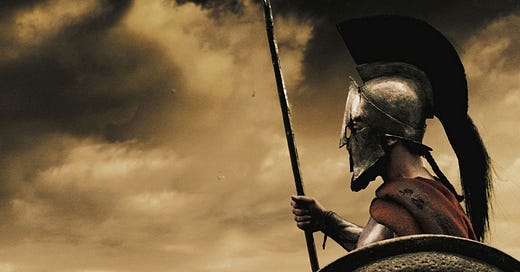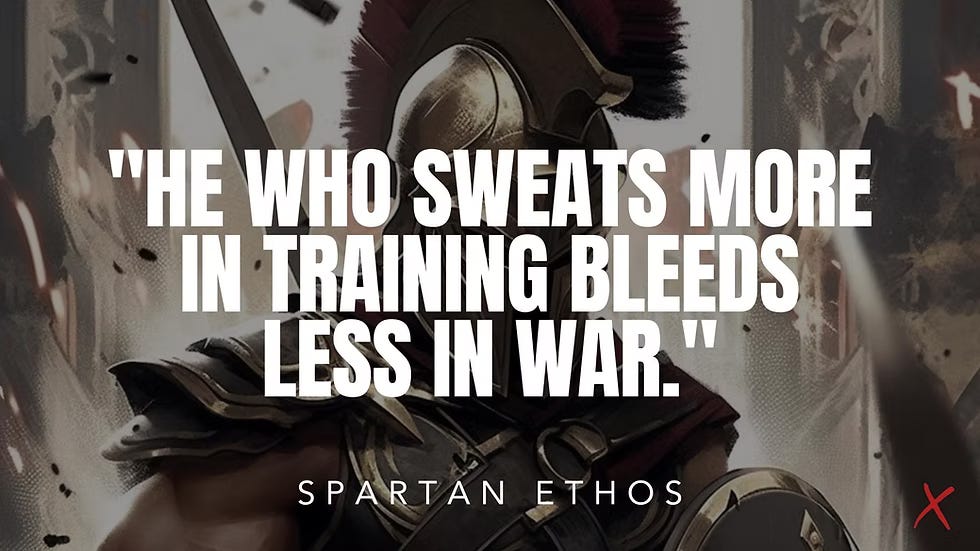🧠 TLDR: What can a 2,500-year-old battle teach modern startup founders? A lot.
From King Leonidas’ strategic use of constraints at Thermopylae to Sparta’s culture of earned authority, defensive innovation, and long-term discipline - this piece draws powerful parallels between ancient warfare and software entrepreneurship.
If you’re a founder navigating limited resources, high stakes, and tough calls, the Spartan mindset might be your best weapon.
The story of King Leonidas and his 300 Spartans at Thermopylae has captivated minds for over two millennia, but beyond its dramatic retelling in popular culture lies a treasure trove of strategic insights that resonate powerfully with modern software entrepreneurship.
While the battlefield and the boardroom may seem worlds apart, the fundamental principles that enabled Sparta to punch above its weight for centuries offer profound lessons for founders navigating the treacherous terrain of building technology companies.
The Power of Purposeful Constraint
Perhaps the most striking parallel between ancient Sparta and successful software ventures lies in their approach to constraint.
Sparta was geographically small, with a population that never exceeded 100,000 citizens, yet it dominated Greek politics for nearly three centuries.
Similarly, the most successful software companies often begin with severe resource constraints - limited capital, small teams, and narrow market focus.
Steve Jobs famously said, "Innovation comes from saying no to 1,000 things," echoing the Spartan philosophy of deliberate limitation.
When Leonidas chose to march with only 300 men to Thermopylae, he wasn't making a desperate last stand but rather executing a calculated strategy that leveraged Sparta's core strengths.
The narrow pass neutralised the Persian numerical advantage, just as successful startups often succeed by finding market "passes" where their focused capabilities can overcome larger competitors' resources.
This principle manifests in software development through the concept of the Minimum Viable Product (MVP).
Like Spartan warriors who carried only essential equipment, successful founders learn to strip away non-essential features and focus on core value propositions.
The constraint forces clarity of purpose and prevents the dilution of effort that often plagues well-funded but unfocused ventures.
Source : Guilherme Rodrigues, Medium, July 2014
Cultural Coherence as Competitive Advantage
The Spartan agoge - their rigorous education system - created not just individual warriors but a unified culture that functioned as a single organism in battle.
This cultural coherence was Sparta's secret weapon, enabling coordination and decision-making that seemed almost telepathic to their enemies.
Modern software companies that build strong, coherent cultures similarly outperform those that treat culture as an afterthought.
Netflix's culture deck, which has been viewed millions of times, represents a modern agoge - a systematic approach to creating cultural coherence that enables rapid decision-making and maintains organisational effectiveness even as the company scales.
Like Spartan warriors who could fight effectively even when separated from their units, Netflix employees can make decisions independently because they share a common cultural framework.
The insight here isn't about creating a militaristic culture, but rather about the competitive advantage that comes from deep cultural alignment.
When everyone truly understands and embodies the company's values, the organisation can move with the speed and precision of a Spartan phalanx.
This cultural coherence becomes particularly critical during crises, when quick, coordinated responses can mean the difference between survival and failure.
The Paradox of Defensive Innovation
Sparta's military innovations were almost entirely defensive in nature - the hoplon shield, phalanx formation, and tactical emphasis on holding ground rather than territory expansion.
Yet these defensive innovations created offensive capabilities that allowed Sparta to project power far beyond its borders.
This paradox offers crucial insights for software founders, particularly those building infrastructure or platform technologies.
Amazon Web Services exemplifies this principle. Jeff Bezos initially built AWS to solve Amazon's internal infrastructure challenges - a defensive move to support the company's e-commerce operations.
However, this defensive innovation created an offensive capability that now dominates the cloud computing market.
The lesson is that solving your own problems deeply and systematically often creates solutions that have broader market application.
The Spartan approach suggests that founders should look for defensive innovations - solutions to problems that threaten their core business - rather than chasing offensive opportunities that may seem more exciting but lack the deep understanding that comes from personal necessity.
Defensive innovations are often more sustainable because they're built on genuine understanding of real problems rather than market speculation.
Leadership Through Earned Authority
Leonidas's leadership at Thermopylae wasn't based on royal decree but on earned respect.
Spartan kings led from the front, literally fighting alongside their men.
This principle of earned authority - ;eading through demonstrated competence rather than positional power - is fundamental to successful software leadership, particularly in environments where knowledge workers can easily move between companies.
The traditional command-and-control model breaks down in software development because the work is inherently creative and the best solutions often come from unexpected sources.
Successful technical founders understand that their authority must be continuously earned through demonstrated value, not simply claimed through equity ownership.
This means staying technically engaged, making meaningful contributions to problem-solving, and maintaining the respect of their teams through competence rather than hierarchy.
Marc Benioff's leadership at Salesforce demonstrates this principle.
Despite being CEO of a massive company, Benioff remains deeply engaged with product decisions and technical strategy, earning credibility through continued relevance rather than simply exercising executive authority.
This approach creates loyalty and commitment that extends far beyond what compensation alone can achieve.
The Strength of Selective Engagement
Sparta's foreign policy was characterised by careful selection of conflicts.
They didn't fight every battle but chose their engagements based on strategic advantage and core interests.
This selectivity wasn't weakness but wisdom - understanding that resources are always limited and must be deployed where they can achieve maximum impact.
Software founders face countless opportunities and threats, from competitor moves to partnership proposals to new technology trends.
The Spartan approach suggests that success comes not from responding to every opportunity but from developing the discipline to engage only where you have genuine advantage.
This requires deep self-knowledge - understanding your company's true strengths and limitations.
Paul Graham's advice to "do things that don't scale" initially, then scale only what works, reflects this Spartan selectivity.
Rather than trying to build comprehensive solutions immediately, successful founders identify the specific contexts where their approach has genuine advantage and focus their efforts there.
This selective engagement allows them to achieve disproportionate impact with limited resources.
The Innovation of Constraint-Based Excellence
The Spartan military system produced innovations not through abundance but through the creative application of constraints.
Limited population forced innovations in training intensity.
Geographic constraints forced innovations in defensive tactics.
Resource constraints forced innovations in equipment design and battlefield coordination.
This constraint-based approach to innovation is particularly relevant for software founders who often mistake resource abundance for advantage.
The most successful software companies often emerge from periods of severe constraint, where necessity forces creative solutions that become competitive advantages.
Twitter's 140-character limit, originally imposed by SMS constraints, became a defining feature that shaped entire communication patterns.
The insight is that constraints often force better solutions than abundance allows.
When you can't hire unlimited engineers, you're forced to build more efficient systems.
When you can't afford enterprise sales teams, you're forced to create products that sell themselves.
When you can't outspend competitors on marketing, you're forced to create genuinely remarkable products that generate word-of-mouth.
Strategic Patience and Long-Term Thinking
Perhaps most importantly, Sparta's approach was characterised by strategic patience.
They built institutions and capabilities that would endure for centuries, not just win immediate battles.
The agoge took decades to shape each warrior.
The constitution balanced power to prevent short-term thinking from undermining long-term stability.
Modern software development often suffers from short-term thinking driven by venture capital cycles and public market pressures.
The Spartan model suggests that sustainable advantage comes from building capabilities and institutions that compound over time rather than chasing immediate returns.
This means investing in developer tools, infrastructure, and culture even when these investments don't show immediate returns.
Amazon's long-term approach to investment, often at the expense of short-term profitability, reflects this Spartan patience.
Bezos consistently chose to build capabilities that would create advantage over decades rather than maximising immediate returns.
This strategic patience, while often criticized by investors, ultimately created one of the world's most valuable companies.
Conclusion: The Enduring Relevance of Ancient Wisdom
The lessons from Leonidas and the Spartans transcend their historical context because they address fundamental challenges that remain constant: how to achieve exceptional results with limited resources, how to maintain organisational coherence under pressure, how to innovate within constraints, and how to build sustainable advantage in competitive environments.
For software founders, these insights offer a framework for thinking beyond the tactical advice that dominates entrepreneurial discourse.
The Spartan model suggests that sustainable success comes not from following best practices but from developing deep principles that can guide decision-making across varied contexts.
Like the Spartan warriors who could adapt their tactics to different enemies while maintaining their core strengths, successful founders must learn to adapt their strategies while staying true to their fundamental advantages.
The ultimate lesson may be that greatness comes not from having the most resources but from making the most of the resources you have - a principle as relevant in Silicon Valley as it was at Thermopylae.
Source : Mind Maestro
References
Cartledge, Paul. The Spartans: The World of the Warrior-Heroes of Ancient Greece. New York: Vintage Books, 2003.
Pressfield, Steven. Gates of Fire: An Epic Novel of the Battle of Thermopylae. New York: Bantam Books, 1998.
Hastings, Reed. "Netflix Culture Deck." Netflix, 2009. Available at: https://www.slideshare.net/reed2001/culture-1798664
Young, Jeffrey. "Amazon's Jeff Bezos: The Ultimate Disruptor." Forbes, December 2012.
Graham, Paul. "Do Things That Don't Scale." Paul Graham Essays, July 2013. Available at: http://paulgraham.com/ds.html
Isaacson, Walter. Steve Jobs. New York: Simon & Schuster, 2011.
Stone, Brad. The Everything Store: Jeff Bezos and the Age of Amazon. New York: Little, Brown and Company, 2013.
Hodkinson, Stephen. "Was Classical Sparta a Military Society?" In Sparta and War, edited by Stephen Hodkinson and Anton Powell. Swansea: Classical Press of Wales, 2006.
Benioff, Marc. Trailblazer: The Power of Business as the Greatest Platform for Change. New York: Currency Books, 2019.
Christensen, Clayton. The Innovator's Dilemma: When New Technologies Cause Great Firms to Fail. Boston: Harvard Business Review Press, 1997.
✍️ Why I Wrote This
I’m endlessly fascinated by startups and the emotional rollercoaster that begins the moment a founder has that epiphany - the “aha!” moment 💡 where a problem grips them so tightly they feel compelled to solve it.
As a recovering Founder and Co-Founder myself - and someone who now supports startup founders and leadership teams across the globe 🌍 - I’ve seen something intriguing: the way a person approaches decision-making, risk, and intuition often varies dramatically depending on their age, experience, or both.
Learning from history is a treasure of life. Last week I was reflecting with a friend on my visit a few years ago to Sparta, to see in real life the place where Leonidas and his Spartans lived, flourished and made history. It was a long journey [6+ hours] but very inspiring and so it triggered my brain 🧠 to think about what could software founders learn from Leonidas in how he led, and how the Spartans lived and prospered. I am planning another trip to this place soon, so keep you posted.
Have you ever made a constraint-driven decision that turned into a strategic breakthrough?
👉 Which of these Spartan principles resonates most with your founder journey? Drop your views in the comments 👇
🎧 Let’s Stay Connected
If you enjoyed this piece, please subscribe here on SubStack and consider following my podcast, The G&T Sessions - where I dive deeper into the minds of remarkable founders, creators, and change makers.
🎙 Listen + subscribe → https://www.linktr.ee/thegtsessions
(For deeper dives into the psychology of founders.)
You can also follow me on X → https://www.x.com/andrewjturner
Ciao for now 👋
– Andrew





